Navigating Reentry: Two Men Share Their Journeys After Decades in Prison
The story was co-published with Black Voice News as part of the 2024 Ethnic Media Collaborative, Healing California.
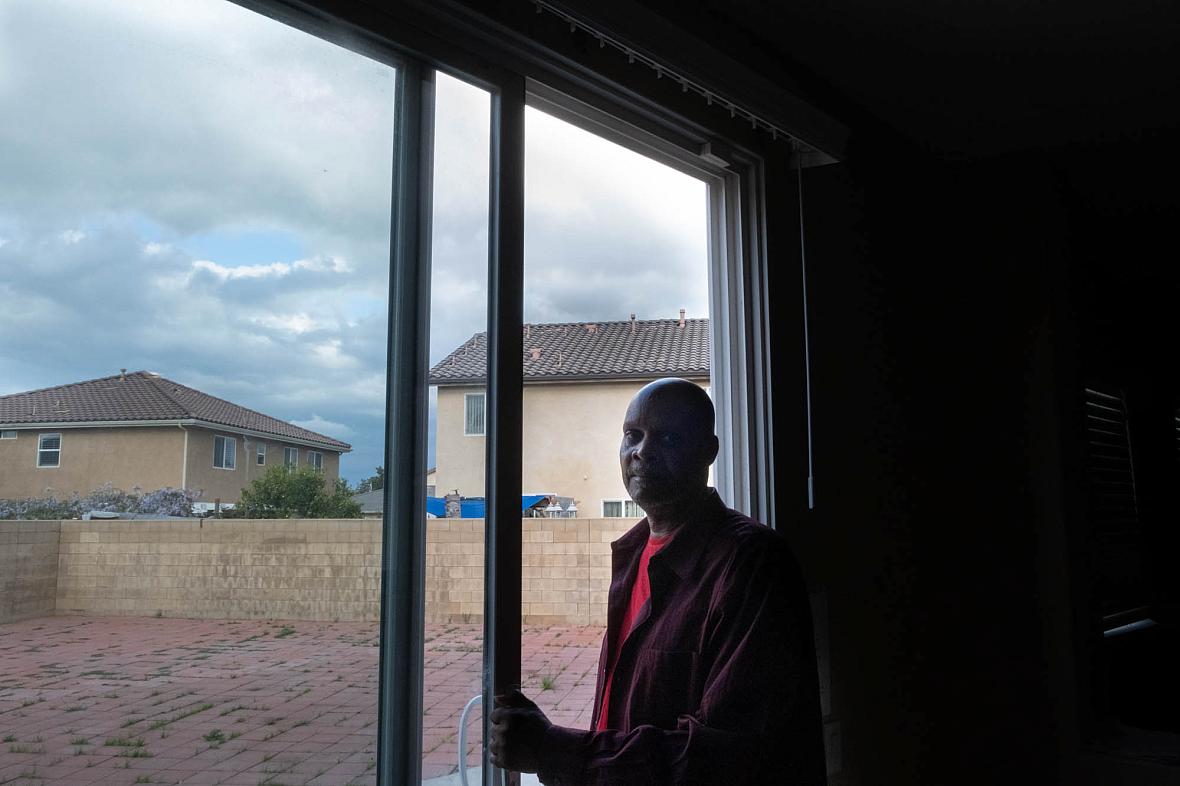
Bennie Burrell, 67, at a group home in Eastvale, CA, where he lives and also presides as the house manager on April 4, 2024. After serving 31 years in prison he was released in March 2023. Today he is a Peer Support Specialist at Starting Over, Inc.
Aryana Noroozi for Black Voice News/CatchLight Local

Each year, California releases roughly 786,970 men and 200,866 women from its prisons and jails to communities around the state. When people leave prison they must learn to navigate life in a new way or risk reincarceration. Richard Jerimiah Giles III and Bennie Burrell were released from prison within the past year after each having served more than two decades inside. Their stories of reentry to society shed light on the complexities of navigating a world they were estranged from for more than twenty years.
The process of reentry — re-entering society after being released from prison — is heavily dependent on access to reentry resources. Oftentimes, these resources focus on life skills, and don’t always address health and well-being.
According to a study published by health policy journal Health Affairs, reentry programs typically focus on practical skills like finding work, opening a bank account and finding housing.“Compared with approaches that focus on health and well-being, these programs are unlikely to achieve identity transformation and self-efficacy in managing health and other needs.”
The study suggested that programs that have the greatest potential to reduce recidivism, a relapse to criminal behavior resulting in reincarceration, are generally therapeutic, targeting substance use disorders, mental illness and patterns of thinking related to criminal behavior.
Vonya Quarles, attorney and co-founder of Starting Over, Inc., a nonprofit organization that employs a holistic approach to reentry, said that without a proper support system people are inclined to turn to the coping skills they are familiar with — not because they want to, but because that is all they know. This approach leads to recidivism. A support system is critical for both the mental health and successful reentry of formerly incarcerated people, Quarles noted.
While the process remains difficult, supports such as peer networks, group sober living homes and family make the process more manageable and reduce the mental toll.
The process of reentry can exacerbate stress even for those who do not have pre-existing mental health conditions. The experiences of Richard and Bennie shed light on the positive impacts a support network has on the mental health of those in reentry, and the correlation between mental health and a successful reentry.
Richard Jerimiah Giles III
Richard Jerimiah Giles III, 58, served over 28 years in prison on a second-degree robbery charge.
In February, he was released from Pelican Bay State Prison in Del Norte County, CA Richard explained that his reentry process has not been easy, but on the outside he finds daily inspiration.
“'I’m learning how to navigate life and society on its own,” he said. “I've made strides because I'm putting in the work.” Each week Richard attends courses hosted at the Starting Over office tailored to reentry and sobriety, as well as another group course centered around employment and entrepreneurial opportunities. He enjoys spending time with his son and granddaughters, taking pride in their academic achievements.
In addition to his own efforts, Richard attributes his success during reentry to his support system.
“I'm blessed with the greatest support system I could ever wish for, I could ever dream of, I could ever pray for,” he explained. “That's what's keeping me on course, along with myself.”
Richard’s reentry journey began with a network. He was connected with resources prior to release by doing his own research. The day Richard was released from prison, a representative from the Anti-Recidivism Coalition picked him up.
“They gave me a cell phone. They took me to my first breakfast at Denny's. I had a big egg yolk, which I'd been feening for about 10 to 12 years,” he said. “I took a lot of pictures. I got to see the ocean, feel the ocean.”
The organization took Richard shopping and to lunch, and then transported him to the airport where he took his first flight in 30 years. He arrived in Ontario, CA, later that night where his son picked him up and made him dinner.
Since then, Richard has enjoyed spending time with his family and loved ones. He recently watched his first film at the movie theaters since being released. He enjoys walking to the pond in his neighborhood and observing the squirrels and rabbits.
“I appreciate the smaller things a lot of people would overlook like walking barefoot on carpet,” he said.
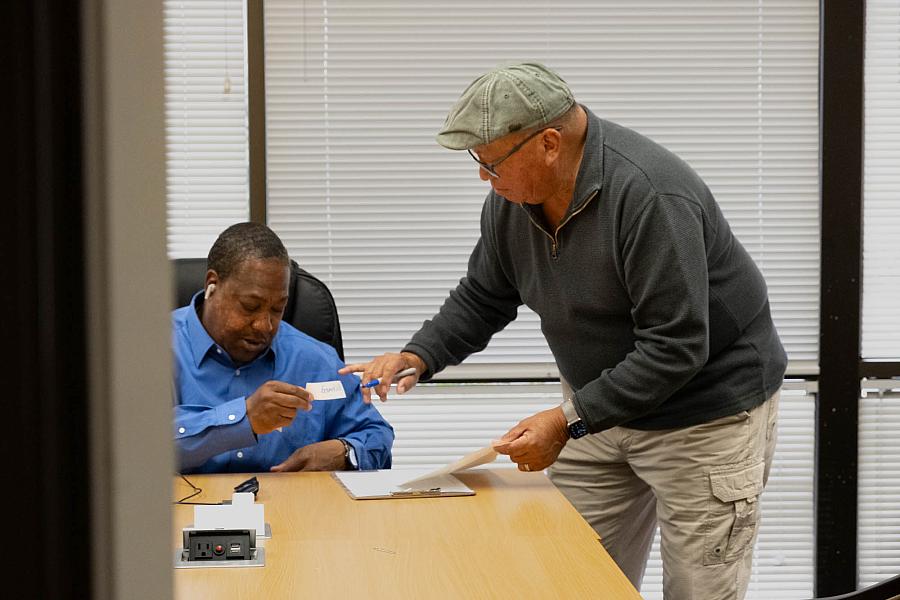
Richard places a nametag on his shirt for a weekly group course on sober living held by Douglas Calderon (right) at Starting Over Inc., an organization that takes a holistic approach to reentry through peer mentorship.
Aryana Noroozi for Black Voice News/CatchLight Local
In just two months, Richard said he has mastered many of the necessary skills for life outside.
“I've learned how to manage money, something that I never did in the past,” he admitted. “I didn't even do that in prison. I spent frivolously on prison packages.”
He still has to juggle the complexities of everyday living like learning the bus system and schedules, obtaining an identification card and managing relationships with loved ones.
A study published in Science Direct analyzed data of men released from prison to examine how pivotal social support is on the health of those reentering society. The study noted that the challenges and obligations associated with community reentry, especially after a long prison sentence like Richard’s, can impact an individual’s “ability to preserve their physical and mental health.”
According to the study, “Ties to a steadfast network of support may be the key to curtailing deleterious physical and mental health issues upon release.”
Richard’s strong network of social support and resources have enabled his successful reentry and positive mental health.
“If you have family members and loved ones, they want your time too, but you have to realize that you got to put yourself first because their life is already on track. Yours is not,” Richard stressed. “Plus, I have to answer to somebody; even though I'm free, I still have to answer to my parole officer.”
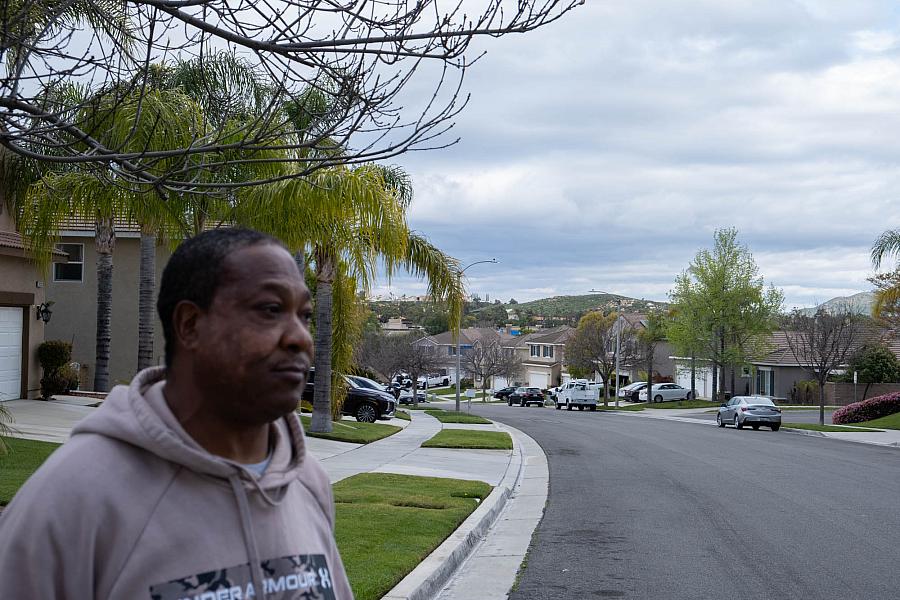
Richard walks down his street on April 4, 2024 in Corona. He describes it as “the most beautiful neighborhood that he ever thought he’d live in.”
Aryana Noroozi for Black Voice News/CatchLight Local
Finding employment is a specific challenge amid reentry that can cause anxiety and stress.
“They often picture themselves as a burden, instead of someone who can help the household,” Quarles said. “They’ve been in the situation, depending upon how long they’ve been incarcerated, where their labor has not benefited their family, and then they come home, and might not be able to get to work right away and so they further burden their families.”
Richard is actively applying for jobs, from pet grooming, to Walmart to fast food, but the process is prolonged as a result of his record of serving time.
Richard lives in a group home in Corona, an area he describes as “the most beautiful neighborhood that he ever thought he’d live in.” He is enrolled to attend Riverside Community College as a Rising Scholar and study sociology in the fall semester.
Starting Over, Inc. provided Richard with housing, so he doesn’t have to pay rent or utilities, but he performs chores each day. The organization also provides Richard with rides to his stipulated programs such as anger management classes.
“Most likely, I’m gonna stumble on some speed bumps, but I'm not gonna let that deter me from my life goals, and that's to eventually be a homeowner and to be married to the woman of my dreams,” Richard said.
Bennie Burrell
Similar to Richard, Bennie Burrell, 67, was recently released from prison just over a year ago. He served 31 years for a felony charge of mayhem, a criminal offense that involves seriously maiming someone.
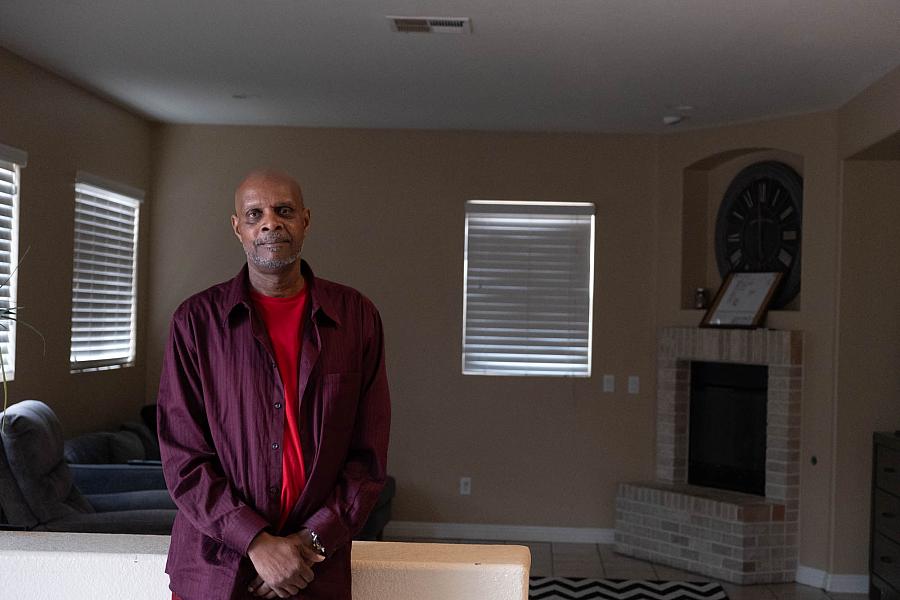
Bennie Burrell, 67, poses for a portrait at the group home in Eastvale, CA, on April 4, 2024.
Aryana Noroozi for Black Voice News/CatchLight Local
In under a year’s time, Bennie is actively giving back to other formerly incarcerated individuals by offering reentry support. He works as a peer support specialist at Starting Over, Inc.. Bennie also works as the housing manager for the transitional home in Eastvale where he resides.
Like Richard, Bennie said his transition has been smooth.
“I do realize and understand that everybody’s transition is not the same,” Bennie said. “I witnessed some of the struggles and problems through others and that’s why I’m passionate about my work.”
The recidivism rate was 42% for people in 2018-19, according to the most recent data available from a recent report published by the California Department of Corrections and Rehabilitation (CDCR). Recidivism rates in the state are calculated using a three-year follow-up period.
Bennie pointed to multiple hurdles in the reentry experience, some of which starts before a person even leaves prison.
“I think it's actually set up to set you up for failure,” Bennie said about California’s prison system. While CDCR has implemented several programs within its prison, they are often limited, understaffed and overall fractured. A 2019 state audit of CDCR emphasized that their rehabilitation programs were inadequate and failed to “meet any of the rehabilitative needs for 62% of the [incarcerated people] released in fiscal year 2017–18 who had been assessed as at risk to recidivate.”
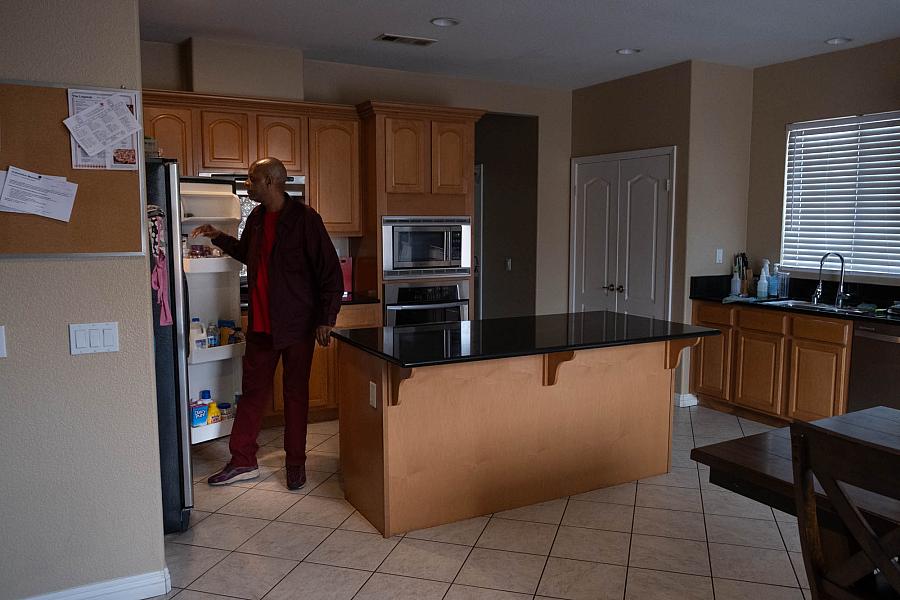
Bennie opens his refrigerator after cooking dinner on April 4, 2024. Everyday the members of the group home where Bennie lives and manages take turns with various chores and keep the home clean.
Aryana Noroozi for Black Voice News/CatchLight Local
The anxieties a person may retain from their time in prison combined with the additional pressures added post release could compromise their mental health.
When someone is released from a California state prison, they are entitled to $200 in state funds upon release. These funds are known as “gate money” or “release allowance.”
“If you compare $200 back 57 years ago, that would be fine. But in today’s money, $200 would barely check you into a hotel for one night and get you a meal to eat so, we know that’s outdated,” Bennie said.
He added that documentation is vital upon release. It took Bennie four months to access his birth certificate which was shipped from Detroit, Michigan. “That was a major setback,” he recalled.
Currently, Bennie is working with Starting Over, Inc. to propose legislation for helping people receive identification cards before they leave prison.
When it comes to managing his own mental health amid reentry, Bennie said that playing chess and basketball have helped him.
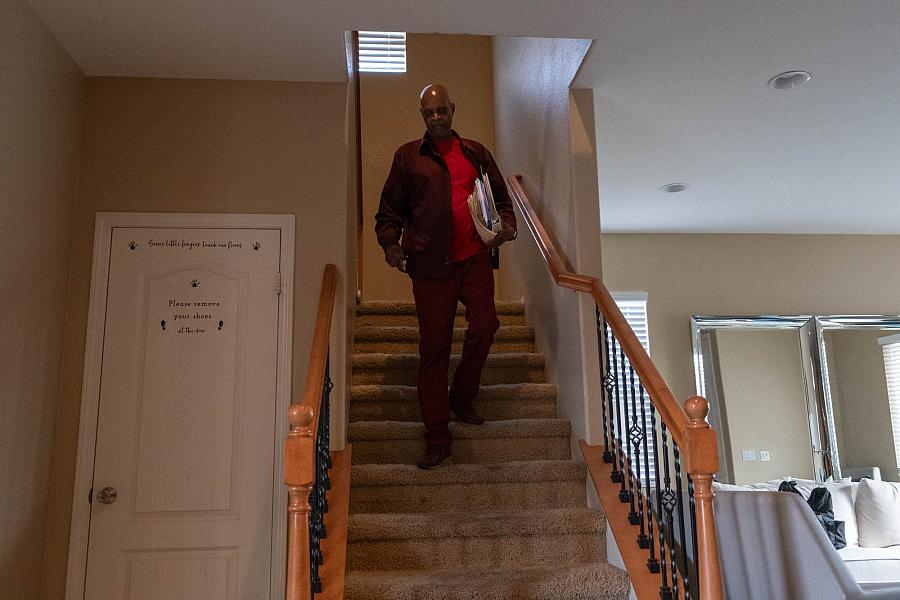
Bennie descends the stairs at the transitional group home he manages and resides in. Bennie’s room is the only door that locks as he is the house manager. Guests are not allowed upstairs.
Aryana Noroozi for Black Voice News/CatchLight Local
“When I first got out, I coached a little youth league basketball team and that was fantastic. That helped me as I adjusted from thinking about certain things that were pressure and stressful.”
His team even won the local championship.
“I’m just moving forward and I understand that everything is a process,” Bennie said. “That's how I deal with it, one day at a time, one step at a time.”
Importance of Peer Support
The process of reentry can exacerbate stress even for those who do not have pre-existing mental health conditions. Richard and Bennie’s experiences shed light on the positive impact that a support network has on the mental health of those in reentry, and the correlation between mental health and a successful reentry.
Yuri Cobb, a case manager at Starting Over, Inc., described what life on the outside may feel like for those recently paroled. Formerly incarcerated people who are newly released often enter a world with no security. Unlike in prison, there is no guaranteed housing, no guaranteed meal times. They are now responsible for securing those things for themselves, Cobb explained.
“All those responsibilities start rolling downhill like a snowball effect and it causes a lot of stress and anxiety for people and sometimes when it's I feel like that they go back to their old habits on how to numb it,” Cobb said.
Both Richard and Bennie’s experiences exhibit how a successful reentry can be established by not having to shoulder stressors by oneself. With the availability of resources and peer support, both men have been able to carve out an initial successful path to reentry.
According to Quarles, communities have become overly dependent on the CDCR for reentry support. Rather, she believes that mutual responsibility within the community will be more effective for those reentering society.
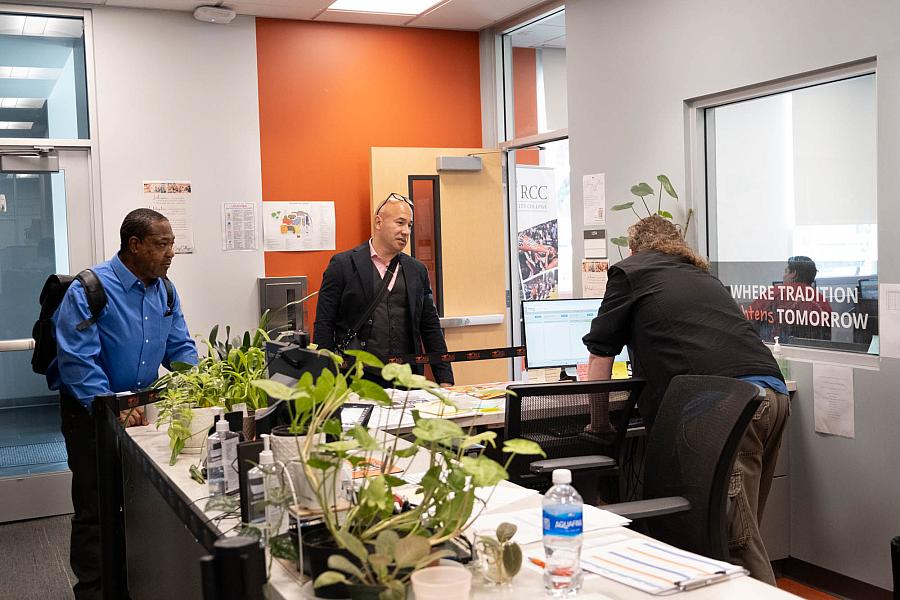
On April 4, 2024, Richard enters the Riverside Community College Financial Aid office, accompanied by his peer mentor, Arturo Ruiz, a community organizer from the organization All of Us or None, to begin the process of filing for financial aid for his upcoming semester.
Aryana Noroozi for Black Voice News/CatchLight Local
When it comes to expanding resources and partnerships to combat recidivism locally, Cobb said she hopes the vast resources and efforts in Los Angeles County can migrate to the Inland Empire.
“We still have a lot of recidivism because a lot of people don’t want to be in LA [to access resources], they want to be closer to their family,” Cobb said. “I feel like once we get more resources out here, we [will] see a big difference within our community.”
An analysis by the Urban Institute found that Los Angeles and San Bernardino Counties have the highest number of California parolee releases. Across LA County there are dozens of nonprofit organizations that address reintegration needs and seek to reduce recidivism. Networks like the LA Reentry Collaborative, composed of several organizations, partner to reduce recidivism, and “promote successful reentry and reintegration” of formerly incarcerated people in Central and South Los Angeles. Another collaborative, the Los Angeles Regional Reentry Partnership (LARRP), is a countywide network of nonprofit organizations, public agencies and advocates that are focused on reentry and ensuring that the system addresses the needs of the collaborating agencies, their communities, and the people they serve.
Though the Inland Empire may have less resources, community-based organizations like Starting Over Inc., IE Rebound and California State San Bernardino Reentry Initiative (CSRI) are taking steps to address community reentry across Riverside and San Bernardino Counties. IE Rebound offers trauma-informed “evidence-based services” such peer-to-peer mentorship and post incarceration processing groups which support formerly incarcerated individuals with their experiences and help them build community.
“I think peer supports are invaluable to someone who is walking the same walk, that the peer support has already walked, ”Quarles said. “I don’t want somebody to tell me I can do it. I want to talk to somebody who’s done it.”
This Black Voice News project is supported by the USC Annenberg Center for Health Journalism, and is part of “Healing California,” a yearlong reporting Ethnic Media Collaborative venture with print, online and broadcast outlets across California.
